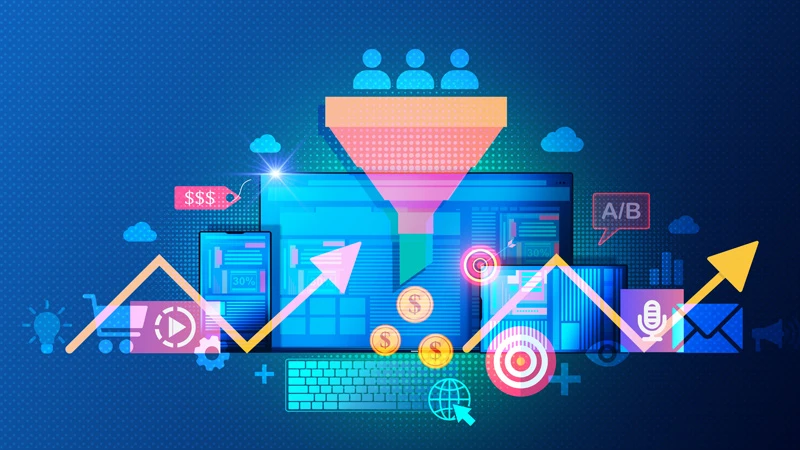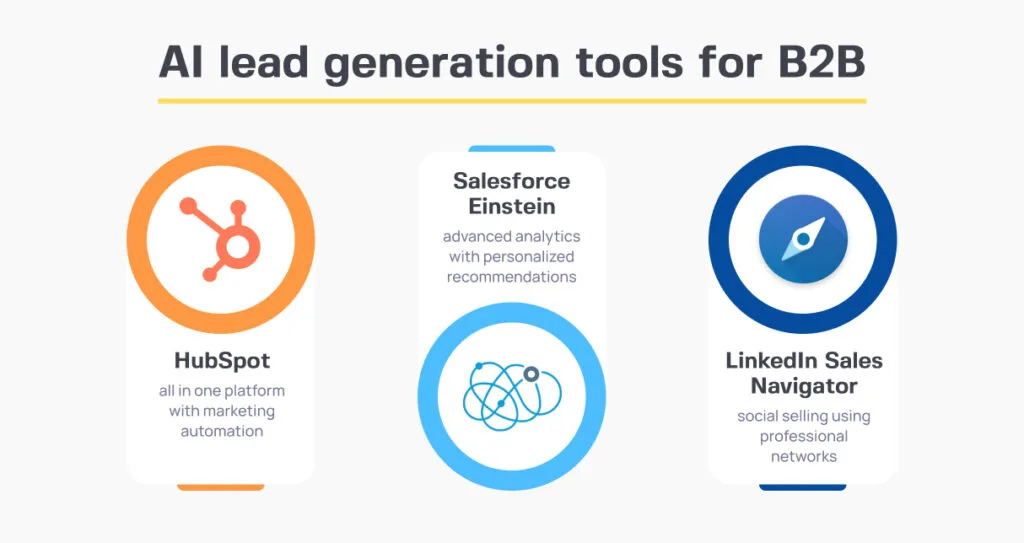How Growth Systems For B2B streamlines supply chain management
Wiki Article
Unlock Performance and Development With AI Automation for B2B Business
AI automation is changing the landscape for B2B companies. It improves procedures and minimizes dependence on human intervention. This shift enables organizations to make quicker, data-driven choices. As companies explore which refines to automate, they must likewise take into consideration the right devices to implement. Nonetheless, challenges remain in adopting AI modern technology. Minarik AI. The ramifications of these modifications might form the future of several business in ways yet to be fully recognizedRecognizing AI Automation in the B2B Context
As organizations progressively look for performance, recognizing AI automation in the B2B context ends up being essential. AI automation involves utilizing innovative innovations to simplify operations, minimize human intervention, and enhance decision-making procedures. In the B2B landscape, this can show up in different forms, such as automating customer care communications, taking care of supply chain logistics, or enhancing advertising and marketing projects. Companies can take advantage of AI to analyze massive datasets rapidly, allowing them to determine trends and understandings that educate critical options. AI systems can integrate perfectly with existing modern technologies, providing a natural platform for taking care of business features. This understanding prepares for companies to discover just how AI can transform their operations, boost performance, and inevitably foster sustainable development in an affordable market.Key Advantages of Executing AI Automation

Identifying Processes Suitable for Automation

Selecting the Right AI Devices for Your Business
When B2B business think about automating their processes, picking the appropriate AI devices ends up being crucial for attaining preferred results. Business must start by reviewing their special needs and goals, making sure positioning with business goals (Minarik AI). Assessing the assimilation, flexibility, and scalability capacities of potential tools is crucial, as these variables determine long-term performance. Organizations should also think about user-friendliness and the degree of support offered by vendors, as these elements can impact effective implementation. Furthermore, assessing customer testimonials and case research studies can provide insights into exactly how certain AI options perform in real-world circumstances. By meticulously picking AI tools that fit their operational requirements, B2B business can enhance efficiency and drive development while decreasing possible interruptionsGetting Rid Of Difficulties in AI Fostering
B2B companies commonly encounter considerable difficulties in adopting AI innovations, specifically concerns connected to data high quality and resistance to alter monitoring. Poor data high quality can prevent the effectiveness of AI systems, while staff member unwillingness to welcome new procedures can stall execution initiatives - AI Automation For B2B. Addressing these difficulties is crucial for successful AI assimilation and maximizing its possible advantagesInformation High Quality Issues
Ensuring high information quality is essential for the effective fostering of AI innovations in business-to-business atmospheres. Unreliable, insufficient, or out-of-date information can drastically impede AI initiatives, bring about incorrect insights and inadequate decision-making. Firms commonly face challenges such as information silos, incongruities throughout different resources, and a lack of standardized information layouts. To get over these concerns, companies have to purchase information cleaning, combination, and governance procedures. Implementing durable information management techniques ensures that the information fed into AI systems is reliable and appropriate. Promoting a society of information high quality recognition amongst workers can enhance data precision over time. By dealing with information top quality concerns, B2B business can release the full possibility of AI automation, driving efficiency and development.Adjustment Monitoring Resistance

Measuring the Influence of AI Automation
Gauging the effect of AI automation in B2B business needs a clear understanding of crucial performance indications (KPIs) that line up with service purposes. Effective data evaluation techniques are vital for translating the results, while robust ROI assessment techniques aid establish the financial benefits of automation initiatives. With each other, these elements offer a substantial structure for examining AI's payments to business success.Trick Efficiency Indicators
Secret efficiency indicators (KPIs) offer as crucial devices for B2B business to analyze the effectiveness of AI automation campaigns. By establishing clear metrics, organizations can gauge enhancements in functional performance, expense decrease, and profits growth directly attributable to automation. Common KPIs consist of cycle time decrease, mistake rates, customer contentment ratings, and worker productivity degrees. These indications offer understandings into just how AI systems are optimizing procedures and improving total efficiency. Additionally, tracking KPIs makes it possible for firms to recognize locations for more renovation and More Info to align AI automation efforts with strategic service objectives. Inevitably, a distinct framework of KPIs warranties that B2B business can quantitatively examine the influence of AI automation on their procedures and drive continual development.Data Analysis Strategies
Reliable data evaluation methods play a crucial role in reviewing the influence of AI automation within B2B firms. By using statistical methods, organizations can identify trends and patterns in operational data, enabling them to evaluate the efficiency gains accomplished through automation. Methods such as regression analysis and time series forecasting give understandings right into exactly how AI-driven procedures influence efficiency and decision-making. In addition, data visualization tools can effectively connect searchings for to stakeholders, assisting in educated tactical choices. Artificial intelligence formulas can additionally enhance analysis by predicting future outcomes based on historic data, using actionable understandings. Eventually, these methods make it possible for B2B companies to measure success and optimize their AI automation efforts, ensuring placement with business objectives and boosting general efficiency.ROI Analysis Approaches
Evaluating the roi (ROI) of AI automation is crucial for B2B companies looking for to understand the economic implications of their technological efforts. Companies can use different ROI analysis techniques to evaluate the performance of AI executions - AI Automation For B2B. One efficient approach includes calculating price financial savings by contrasting functional costs before and after automation (Minarik AI). In addition, determining productivity improvements with key efficiency signs (KPIs) assists evaluate the benefits of AI. Client complete satisfaction metrics can additionally supply insights into the effect of automation on service top quality. To guarantee a detailed assessment, business ought to think about both straight monetary returns and abstract benefits, such as enhanced decision-making capabilities and affordable advantage. This multifaceted assessment makes it possible for B2B companies to make educated choices relating to future investments in AI modern technologyFuture Patterns in AI Automation for B2B Business
What innovations exist ahead for AI automation in B2B firms? Emerging patterns indicate a substantial change towards improved information analytics abilities, making it possible for services to make even more educated decisions. Predictive analytics will certainly end up being progressively necessary, permitting business to prepare for market modifications and consumer requirements. In addition, the integration of AI with Web of Points (IoT) modern technology is expected to improve procedures by giving real-time understandings and automation of processes. Companies will likewise concentrate on boosting customer experiences through customized advertising and marketing driven by AI formulas. Advancements in natural language handling will help with better interaction in between organizations and clients. As these fads evolve, B2B business must adapt to take advantage of AI automation efficiently, making certain continual development and competitive advantage.Often Asked Questions
What Industries Advantage the A Lot Of From AI Automation in B2B?
Manufacturing, financing, healthcare, and logistics markets benefit the most from AI automation in B2B. These industries take advantage of AI to maximize procedures, enhance decision-making, and improve overall functional effectiveness, driving considerable growth and innovation.Just How Does AI Automation Effect Employee Roles and Responsibilities?
AI automation improves worker roles and duties by enhancing repeated jobs, making it possible for workers to focus on critical efforts. This shift cultivates skill growth, improves productivity, and urges partnership, ultimately driving business growth and technology.What Prevail Mistaken Beliefs About AI Automation in B2B?
Usual misunderstandings concerning AI automation in B2B include anxieties of task loss, ideas that AI can fully change human judgment, and ignoring the relevance of partnership in between AI systems and workers for ideal outcomes.How Can Organizations Guarantee Information Personal Privacy With AI Automation?
Companies can assure data privacy with AI automation by carrying out durable encryption methods, sticking to regulatory conformity, performing regular audits, and training workers on information taking care of practices to alleviate threats and protect sensitive information.What Are the Costs Related To Carrying Out AI Automation?
The prices connected with executing AI automation consist of software acquisition, facilities upgrades, training workers, recurring upkeep, and possible downtime during integration. Additionally, business may incur expenses associated with data safety and compliance steps.Determining the effect of AI automation in B2B business needs a clear understanding of vital efficiency indicators (KPIs) that align with company goals. Secret performance signs (KPIs) offer as crucial devices for B2B firms to analyze the performance of AI automation campaigns. Reliable data analysis techniques play an important role in evaluating the impact of AI automation within B2B firms. Examining the return on investment (ROI) of AI automation is necessary for B2B business seeking to recognize the monetary implications of their technical efforts. What developments lie in advance for AI automation in B2B companies?
Report this wiki page